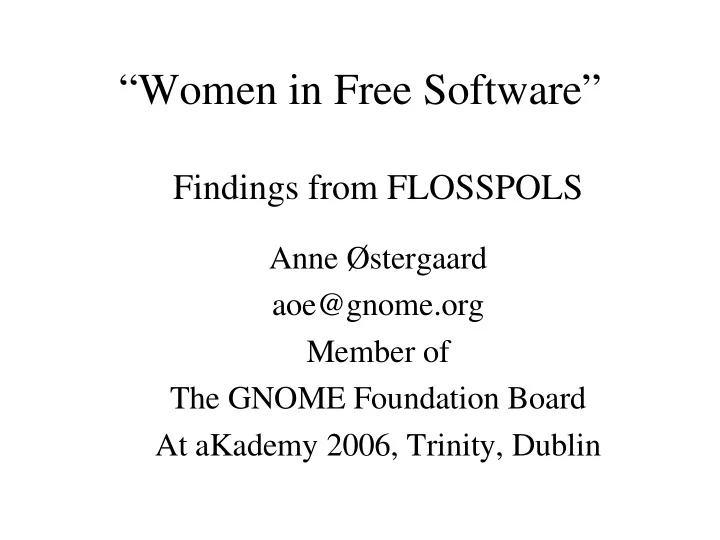

“Women in Free Software” Findings from FLOSSPOLS Anne Østergaard aoe@gnome.org Member of The GNOME Foundation Board At aKademy 2006, Trinity, Dublin
Are women in FLOSS considered as bugs, babes, groupies, or equal partners in their fields?
Proprietary Software
Free Software
Why is it so?
FLOSSPOLS project • Studies on Free/Libre Open Source Software • Funded by the EU commission • March 2004 to February 2006 • Three strands: One on gender
Gender Study: Aims • Produce first study of gender in FLOSS • Gather socio-economic data • Identify reasons for the gender gap • Establish recommendations for change
Study Methodology • Ethnography • Unstructured and semi-structured interviews • Participant observation • Quantitative methodology: • Online survey (1541 participants)
Would more female participants be better for the whole community?
As FLOSS constitutes an increasingly significant arena of technological advancement and economic development, it has become an important public policy question!
Are women not interested in FLOSS? or Are women being excluded?
Hidden discrimination? "Most discrimination of all kinds is utterly unintentional, and that kind of dis- crimination is harder to tackle because there is no evil intent and no-one to directly blame. It still needs tackling and that is in part about making people understand when their culture and actions put off or exclude others." -- Alan Cox.
Conscious or unconscious exclusion? • Jokes about women • Using ”he” in documentation • Assuming that society is gender blind • Valuing coding as superior to all other skills
Is code the only thing that matters? Typical tasks: Men Women • Writing code • Documentation • Testing • Organising events • Bug reports • Translating • ”Technical tasks” • ”Social tasks”
“ Regarding the FLOSS community as a whole, have you ever observed discriminatory behaviour toward women?”
Do women have as much experience with computers?
The usual role models? Have a look at some new role models!
”For whom is it easier to get acknowledgement for FLOSS work?”
Is it true that women get more attention for their gender than their skills? Men and women agree. - The answer is yes!
Recognition Thank you to University of Cambridge and: • Bernhard Krieger • James Leach • Dawn Nafus • Hanna Wallach • Graphs provided by Hannah Wallach
The man and his machine.. ”Everything was to do with computers. Absolutely everything.” The question why women are absent from computers is the wrong question. When in fact technology has been defined as ”that which men do.”
Historically technologies stop being technologies when women have access to them! Technology is a masculine culture!
What can be done to change the situation? • Code of Conduct • Mentoring projects • Change of culture • Word of mouth • No ”Flamewars” • Competition within FLOSS 4 vision and • Value other tasks implementation • Provide role models • Respect different • Women giving ways of presentations at communication conferences
What can be done to change the situation? • Good for women = • Create price for ICT Good for everyone! female(s) of the year • Offer help at the • Merge technical and terms of recipients social values • Diversity is good! • Have concern for the feelings of others • Universities to start • Be open and flexible change programs • No women - No • EU is behind the rest sponsoring/funding? of the world
What can be done to change the situation? • Financial support Short term interventions: Short term interventions: for girls • Holiday camps • Foster the parti- • Help to overcome cipation of girls in confidence problems FLOSS activities at • Offline events are cru- an early age cial for the feeling of being integrated in a community
Recommendations: 1) Work with the community’s values and social dynamics. 2) Anything that has to do with special help based on gender is likely to undermine rather than assist.
Recommendations ” If we could bring the general hostility down it would probably help all people interested in contributions.” -- Alan Cox • Bevare of different communication patterns and habbits between men and women. • The norms of society in general are most likely mirrored to an extent. We in FLOSS can influence the future for better norms.
Loosing a talented labour pool, and loosing with it the opportunity to build better technologies, is already recognised as a problem within the community. This pragmatic concern is far more likely than social justice concerns to motivate action.
What if there were equally many men and women? Do you remember the pie charts on the slide 3 and 4? How many more contributions would there be?
Conclusion A mixed and welcoming culture is better for all ... ... than an all male dominated mono-culture.
Where do we see positive change? • The small school girls in Extremadura. 80% of the girls are active ICT users and creators - And they enjoy ”IT”! :) • Projeto Software Livres Mulheres, Brazil. http://mulheres.softwarelivre.org/ • Debian Women • The GNOME Women's Summer Outreach Program 2006. http://www.gnome.org/projects/wsop/
Links • http://www.debian.org • http://www.flosspols.org/ • The full flosspols report on gender http://tinyurl.com/ekdd7 • The recommendations http://tinyurl.com/jtt2r • http://www.murrayc.com/blog/permali nk/2006/05/12/women-in-open-source
Questions? Ideas for action? Yes, I will do a BoF for identifying further ideas for a change process. Anne Østergaard aoe@gnome.org
Recommend
More recommend